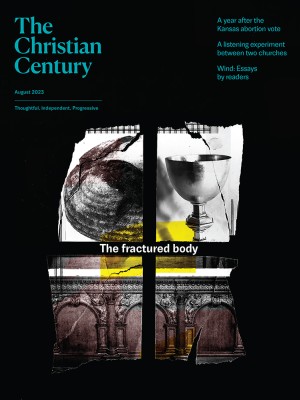Atonement without participation?
In the substitution theory, God simply does stuff for us. What about the relational God of the Bible?

(Illustration by Martha Park)
Perhaps our most famous Christian account of redemption is commonly known as substitutionary atonement. It runs something like this: in the beginning, God created the earth, and it was good—but then we messed it all up. We fell, because of our choices, into sin—a great sin against God’s infinite mercy and justice and goodness.
Because we mucked up the world, there was no way we could put it right; indeed, God would have been perfectly within his rights to destroy humanity. But God’s mercy got the better of his anger. He came up with a solution. For while his infinite mercy may have allowed him to let things rest, his infinite justice demanded that payment for sin be made. Only an infinite payment would do—something only God could offer.
Read our latest issue or browse back issues.
But here’s the problem: it was humans who fell in the first place, so the payment had to come from the human side—otherwise it wouldn’t be a real payment. God came up with this cunning plan: send his son into the world as a man so he could pay the price. Since he was human, his son could fulfill the human requirement; because he was God, he could make an infinite payment. And that payment was made on the cross. The full and sufficient sacrifice. A blood sacrifice of the son covers the sins of those who choose to follow him.
I hope I haven’t simply offered a straw man version, not least because I don’t want to knock it down without acknowledging its power. It resonates with that bit of me that rather likes logic and transactions. Equally, it appeals to something atavistic and bloodthirsty in me: that part of me which, for all my civilized urbanity, is secretly fascinated by the question of whether violence can produce good effects.
However, I also sense that, ultimately, substitutionary atonement is an idolatrous account of redemption. Idols are made for us; they are part of our need for things that function for us. They may look impressive, but they exist to make us safe, make us look better, or reinforce our self-identities and values. They become foci for our best and, sometimes, our worst aspects. They exist to make the way we are and the place in which we are set livable. They provide a way to stage-manage the human and the Divine.
The substitutionary atonement theory keeps God and us one step removed. It doesn’t invite our deeper participation; it indicates how God does stuff for us, and the participation it invites is mostly just intellectual assent.
Certainly, this intellectual assent may have implications for behavior, especially when joined with the threat of eternity in hell should one fail to behave as God requires. Yet this God seems as managed and controlled as the Baals and the golden calf. For all the talk of infinite mercy and infinite justice, this is a God whose redemptive action operates according to a rule, who works according to structural imperatives we impose. There is surely a sense in which this picture of God—stage-managed, trapped in intellectual categories and logic systems, simultaneously angry and gracious according to a rule—is less attractive than the puckish, distressing complexity of the Greek gods.
By contrast, the God who saves—the God of Abraham, Isaac, and Jacob and the God of Jesus Christ—is a God who is caught up in the world and who redeems from within the world. The God of the Bible is the God of relationship. This is the God who meets our gift for perdition and failure as the God of gift. He is the one who makes a gift of himself and says that the only adequate response to the grim facts of a precarious world is in relationship with abundant love.
This relationship requires honesty. While we hold within our species a gift for art and making and the divine spark of God’s holy love, we also have a genius gift for messing up. There is liberation in acknowledging this truth. We may be made in the image of God, but to grow into the likeness of Christ often seems impossible. Clearly, the whole of creation is compromised, limited, and precarious—and our species’ place within it more often has the character of an ecology of exploitation, greed, and failure rather than an ecology of grace. That’s who we are, in this limited world we occupy, and in the midst of our serial failure to act for the good, what we have left as an offering is our longing and hope.
I sense then that God invites us to read our capacity for failure, foolishness, and injury less through the lens of shame and more through that of gift. This is a significant shift, because if we accept that the God who saves comes to us as abundant gift, not holding back but emptying himself in Jesus Christ, then it matters how we greet him.
I’m not suggesting that the work of redemption depends on our attitude or disposition. God’s work is God’s work. Salvation is gift, regardless of our reception of it. Christ redeems.
However, the shape, form, and content of the gift is ultimately an invitation into full and joyous relationship with the living God. And this is a living, embodied, and dynamic matter, not an intellectual schema. It requires the whole of our embodiment, in all its richness and particularity, in our limitations and strangeness. How we—individually and communally—greet God’s invitation embodies a potent way of modeling the gift of holiness in a holy and wholly precarious world.






